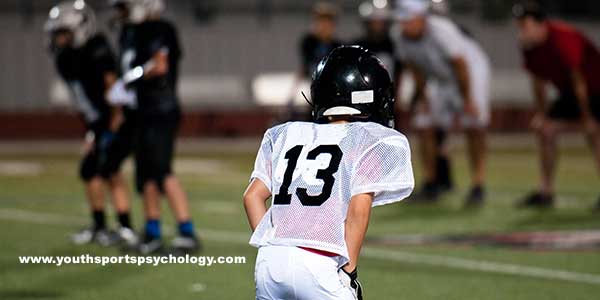How to Separate Training from Competition
What is a competitive mindset? Can young athletes learn to develop a competitive mindset?
They can, but first they need to understand the difference between the training mindset and the competitive mindset.
When kids are in the training mindset, they focus on improving the fundamental aspects of their sport. This is the time, generally during practice, to analyze mechanics, work on tactical skills and develop physiological capacities through drills and repetition.
Kids should have a competitive mindset when they’re competing. They should focus on performing athletically, competing aggressively, having a laser focus or being resilient.
One of the challenges for athletes is to avoid getting stuck in the training mindset, especially when they compete.
To avoid this, how can kids develop a competitive mindset?
Some athletes believe the competitive mindset cannot be learned. They think they either have it or don’t. But that’s not true. Kids can develop their mindset just like any other skill.
So how do athletes develop the competitive mindset? They can train to do this during practice. In fact, if they don’t, they won’t experience the benefits of having an elite competitive mindset in competitions.
If kids aren’t laser focused while training, they won’t be laser focused during competitions. If they’re not working to be resilient in training, it will be more difficult to bounce back from adversity in competition. If kids play it safe during scrimmages, they won’t be aggressive in competition.
Sports kids’ performance is a product of training. They need to work on their competitive mindset during practice, so they can rely on that mindset when they compete.
As the U.S. women’s national soccer team continues its preparations for the Tokyo Olympics, the younger players are learning how to develop their competitive mindsets from their veteran teammates.
U.S. midfielder Samantha Mewis has learned a lot from teammate Carli Llyod on how to build a competitive mindset.
“I feel like as a young player coming on this team, [Carli Lloyd] set such a good example of just the way to take good care of yourself, to be a true professional and to really just not take no for an answer, to just put yourself out there all the time, be a little bit unapologetic about what you want and what you’re willing to do to get it,” said Mewis.
Mewis has witnessed the team’s years of success and wants to learn from its competitive mindset.
How sports kids perform is the result of their training. If they want to compete at a high level under pressure, they must work on their competitive mindset in practice. For example, gymnasts call it doing pressure sets in practice. Dancers and figure skaters do dress rehearsals.
To help kids develop a competitive mindset, ask them to start by working on their competitive mindset in practice. They can do this during scrimmages. They can do dress rehearsals and pressure sets to replicate competition.
Next, kids should remind themselves to stop practicing and training when they enter competition. Now is the time to get the job done with the skills they have!
During games and competitions, young athletes should think about performing athletically and intuitively. This doesn’t mean they are performing mindlessly. Instead, they’re trusting their motor memory and reacting to their environment or the routine in their minds.
Coaches and teammates are happy when athletes perform aggressively and take risks–even when they might lose.
When parents and coaches help kids develop a competitive mindset, they’ll see the results during games or competitions.
Help Your Kids Improve Mental Toughness
It’s no secret that sports success is linked closely to an athlete’s mental toughness. If your young athletes struggle to perform well in competition, are frustrated with their performance, talk about quitting or display low confidence levels, mental game training can help. Both you and your young athlete can learn how to build mental toughness and improve performance with sports psychology coaching for kids.
One-on-one sports psychology coaching is the fastest and most effective method to improve your athletes’ mental game, boost their performance, and make lasting changes. And as a bonus, parents learn what to say to help young athletes feel confident and thrive in sports.
Please call us at 888-742-7225 with your questions. Please contact us today to learn more about individual mental coaching programs for serious young athletes on a mission to greatness:

